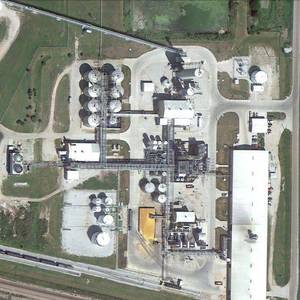Aventine plant now successfully running on corn

Aventine Renewable Energy Inc.
August 7, 2014
BY Holly Jessen
With the recent announcement that Aventine Renewable Energy Inc. has successfully restarted its 45 MMgy ethanol plant in Aurora, Nebraska, the company has now attained its goal of restarting four Aventine facilities. The company emerged from bankruptcy in early 2010 and is now operating two ethanol plants in Aurora and two in Pekin, Illinois.
Nebraska Energy LLC, the 45 MMgy Aurora plant, which has been part of the company’s portfolio since 1995 and is of Vogelbusch-design, resumed operations in June. As of Aug. 4, the plant had processed more than 600,000 bushels of locally grown corn and shipped 1.2 million gallons of ethanol and distillers grains by rail and truck. The plant had been idle since the spring of 2012. “We expect to meet rate capacity for corn ethanol production by mid-August, a further demonstration of our leadership position in the ethanol industry,” said Mark Beemer, Aventine's president and CEO.
Aventine has hired 24 employees to work at the plant and invested $700,000 to upgrade the plant’s operating systems, including adding a new grain-grading laboratory, new scales and other equipment to weigh incoming loads of corn and new access roads. “It’s a very efficient, streamlined process,” he said.
Advertisement
The legacy plant is located adjacent to the company’s 110 MMgy Delta T facility. It restarted in February and has been running on 100 percent beet sugar purchased from the USDA in the fall of 2013. “We think the sugar campaign will end sometime the end of September,” Beemer told Ethanol Producer Magazine. “And then at that point we will migrate over to 100 percent corn.”
In Pekin Aventine has a wet mill ethanol plant and a smaller Fagen Inc.-designed dry mill ethanol plant. The two plants have a combined capacity of 160 MMgy. The company has a ribbon cutting planned for Aug. 15, to celebrate the completion of a project to replace three aging coal boilers with two natural gas fired boilers, Beemer said.
The company is also halfway to a goal of selling two idled plants. In March Valero Energy Corp. announced it had purchased the former Aventine plant in Mount Vernon, Indiana.The company said in late July that it planned to have that facility restarted in the third quarter. The facility was completed after Aventine emerged from bankruptcy and never reached full ethanol production after a grand opening held in April 2011.
Advertisement
A fifth Aventine facility, the 38 MMgy former Riverland Biofuels plant, has been shut down since the spring of 2010. Aventine purchased the ethanol plant for $16.5 million in the summer of 2010. The company continues to search for a buyer for the facility, Beemer said.
In related news, more than one court case is currently working its way through federal court in reference to the Aurora facilities. Although a July Reuters article characterized it as a battle over Aventine’s use of sugar as a feedstock, rather than corn, that’s not the case, said George Hohwieler, president and chief executive of the Aurora Cooperative Elevator Co. It actually goes back to contracts between the two parties signed in 2006 and has to do with a property ownership option, grain supply agreements and railroad track use agreements. “There’s a number of court cases that are pending in federal court,” he told EPM. “Some have the cooperative as the plaintive, and some have the cooperative being the defendant in the case. It’s a pretty complicated lawsuit process.”
Hohwieler clarified that the Aurora Cooperative Elevator is pleased to see the Aurora ethanol plants in operation again. “We want these two plants to run and be fully functional to create additional markets for our grain producers,” he said. The contracts are what is at issue. “We’ve met every contractual obligation that had been set up within the contractual agreements, and we expect Aventine to be held accountable for the contractual agreements,” he said. Beemer declined to comment on ongoing litigation.
Related Stories
Moeve has reached a strategic agreement with Grupo Armas Trasmediterránea to supply 2G marine biofuels in the Canary Islands, with approximately 40,000 tons to be delivered through December 2025 under a long-term contract.
Castle & Cooke Aviation, a premier provider of luxury FBO services, now offers sustainable aviation fuel (SAF) from Avfuel Corp. at Van Nuys Airport (VNY) in Southern California. The SAF produced by Neste.
General Index and ATOBA Energy are partnering to bring a brand-new vision of how SAF benchmarks are built. SAF indexes need to be tailored to the unique cost profiles of diverse production technologies, the companies said.
The Singapore Airlines Group has signed agreements with Neste and World Energy to acquire sustainable aviation fuel (SAF) and SAF certificates, respectively. The purchases include 1,000 metric tons of neat SAF from Neste.
Biomass Magazine has announced the dates for the 19th annual International Biomass Conference & Expo. The event is scheduled to be held March 31-April 2, 2026, in Nashville, Tennessee, at the Gaylord Opryland Resort & Convention Center.
Upcoming Events










